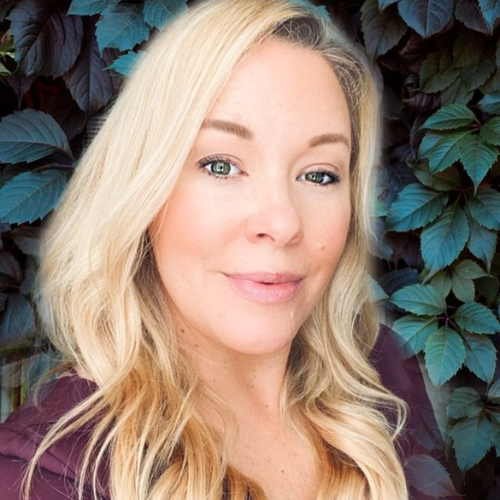Are you getting enough deep sleep at night? Sleep is one of the most powerful forces impacting your health and well-being, yet more than one-third of Americans aren’t getting enough of it. Even if you are reaching the recommended 8 hours of snooze time each evening, you could still be coming up short of one particular type of sleep: deep sleep.
It’s time to take a deep dive into deep sleep, and explore the ways deep sleep benefits your health and how you can get more of it.
What Exactly is Deep Sleep?
When you go to bed at night, your brain traverses from wakefulness through different sleep cycles: deep sleep and REM sleep (or dream sleep).
If you were able to look at your brain waves, the patterns of electrical activity in your brain change dramatically as you move from wakefulness to deep sleep to dreaming sleep.
While awake, your brain waves are rapid and appear surprisingly chaotic. Your waking brain is quickly processing information and stimuli from various parts of your brain simultaneously.
As you fall into sleep, you enter the first phase of sleep, a phase known as non-rapid eye movement (NREM), deep sleep, or deep wave sleep. At this phase, your brain waves slow down significantly. They also sync up into a predictable pattern, moving in a single direction from the frontal lobes toward the back of the brain.
From deep sleep, you transition into the REM sleep phase. During REM (rapid eye movement) sleep, your brain waves pick up speed and become less organized, similar to what your brain waves look like during wakefulness. This is the dream phase of sleep, where your mind is active while your body sleeps.
You will cycle through deep sleep and REM sleep multiple times throughout the night, each phase bringing its own unique benefits (and challenges).
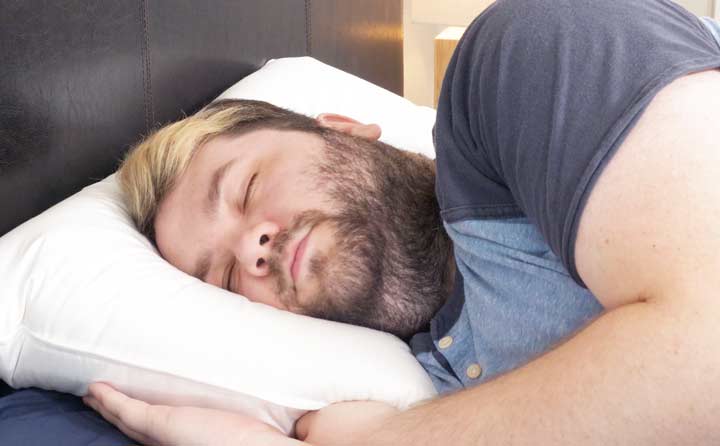
The Deep Sleep Cycle
There are three distinct cycles in the NREM sleep phase:
- Stage 1: lasts 1-7 minutes
- Stage 2: lasts 10-25 minutes
- Stage 3: lasts 20-40 minutes
Stage 1 sleep is the period when you first start falling asleep. It lasts between 1 – 7 minutes, during which your brain and body start to relax. At this phase, you can either be easily woken up or, if left undisturbed, can quickly transition into the next, deeper stage of sleep.
Stage 2 sleep is the stage when your body and brain begin to slow down. For 10-25 minutes, your body temperature drops, heart rate, breathing, and brain activity slow, and muscles relax. It’s more difficult to wake at this stage. Each stage 2 cycle gets progressively longer throughout the night.
Stage 3 sleep is the final phase of your NREM sleep cycle. This is deep sleep. During this 20-40 minute phase, your body relaxes even further, and your brain activity organizes into a predictable pattern known as delta waves. Deep sleep is also known as “slow wave” sleep and is the deepest, most restorative period of sleep. If something wakes you up in the middle of this deep sleep stage, you can feel extremely groggy and disoriented.
The final phase in your sleep cycle is the REM sleep phase. During the 10-60 minute REM sleep phase, your brain activity increases as you dream. Rapid eye movement occurs, and your body experiences temporary muscle paralysis, preventing you from acting out your dreamscape.
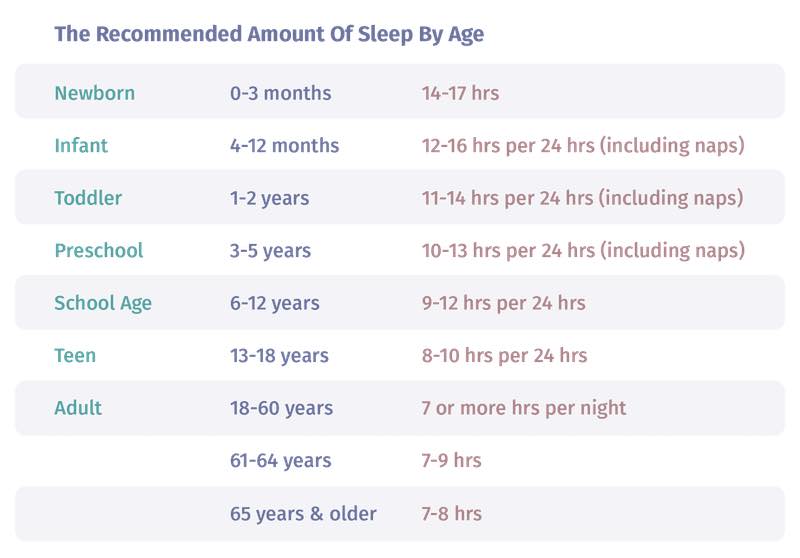
How Much Deep Sleep Do You Need?
You’ve probably heard that you should get about 8 hours of sleep each night. While that’s a good general rule of thumb, the reality is that your sleep needs change as you age. A baby needs 12 to 16 hours of sleep, while a teenager requires 8 to 10 hours.
Most adults need a minimum of 7 hours of sleep for optimal brain and body function, according to the American Academy of Sleep Medicine and Sleep Research Society.
The recommendations for how much sleep you need seem pretty straightforward, but if you’re hitting your 7-8 hours but don’t feel rested, it could be because you’re not getting enough deep sleep.
As you sleep, your body cycles through the three phases of NREM and the REM (dreaming) phase.
A complete sleep cycle can take anywhere from 70 to 120 minutes. The first sleep cycle is the shortest, with each cycle getting progressively longer throughout the night. Interestingly, you’ll have more deep sleep earlier in the evening and longer REM sleep cycles with less deep sleep later in the night.
The three-stage NREM cycle makes up 75-80% of your total sleep time; the remaining 20-25% is dreaming in REM sleep.
About 10-20% of your total sleep budget is spent in the third and deepest stage of sleep. That means you average 96 minutes of deep sleep throughout the night if you’re sleeping for 8 hours.
How Are Some People Natural Deep Sleepers?
Why do some people seem to sleep “like the dead” while others wake to every single sound or sensation?
According to researchers, it’s all in the genes.
Researchers at the Peter O’Donnell Jr. Brain Institute discovered two genes that affect sleep in mice: one that regulated the amount or need for NREM sleep and another that controlled the need or amount of REM sleep.
The genes you inherit may stack the deck for some people to get more NREM sleep at night. But for others, getting more restorative deep sleep may require a bit more effort.
Luckily, sleep experts have shown you can influence how much deep sleep you get each night, naturally.
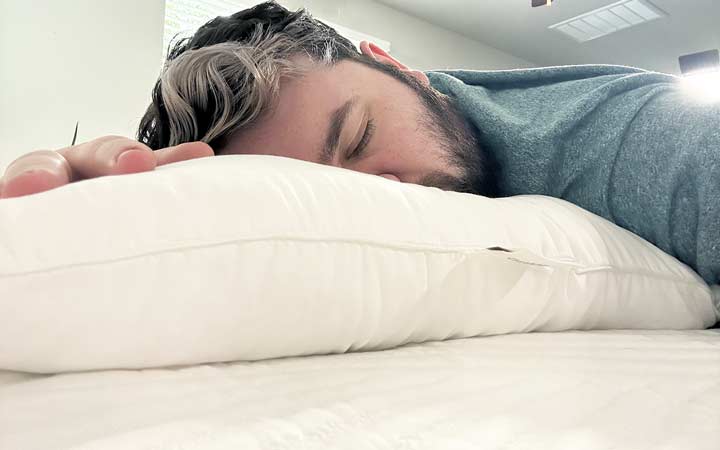
How to Get More Deep Sleep Naturally
There are no shortages of sleep remedies available if you’re struggling to fall asleep and stay asleep at night. However, some sleep aids come with more potential health risks than others.
Certain sleep aids, like melatonin, are produced in your body as part of the natural sleep process. Melatonin is a hormone that affects your sleep-wake cycle (known as the circadian rhythm). Your brain releases melatonin based on sunlight levels, which is why you want to sleep when daylight wanes and wake up as the sun rises.
Other natural supplements to support sleep can include:
- valerian root
- kava
- chamomile
- lavender
- tryptophan
- 5-HTP
Many prescription sleep medications are classified as “sedative-hypnotics” and work by making you feel relaxed or drowsy.
Whether a prescription sleeping pill or an over-the-counter natural supplement like melatonin or valerian, it’s important to be aware of the potential risks and side effects of sleep aids.
Matthew Walker, Ph.D., sleep scientist and author of Why We Sleep, warns against the use of prescription sleeping pills. According to Dr. Walker, prescription sleeping pills fail to provide the same memory-forming benefits you get from natural deep sleep. Instead, they led to a 50% reduction in brain-cell connections formed during learning.
And many prescription sleeping pills in the sedative-hypnotic category come with dependency and substance abuse risks.
Even natural supplements like melatonin have potential risks or side effects. Melatonin use has been linked to dizziness, headaches, and fragmented sleep, while valerian side effects can include headache, upset stomach, drowsiness, or even excitability and insomnia in some people.
Beyond sleep aids (whether prescription, OTC, or natural supplements), there are other ways to optimize your body and brain for more deep sleep with no reported side effects at all.
Sleep Meditation
Meditation may be the key to improving sleep without any unpleasant side effects. According to researchers, meditation has been shown to significantly improve sleep quality.
Meditation for sleep can help your body relax, increase melatonin production, calm your nervous system, and help you wind down at night.
If you’ve never meditated before, try this 20-minute guided meditation for sleep from Mindfulness.org.
Music for Deep Sleep
If you recall, deep sleep is also known as slow-wave sleep, where brain activity slows and creates delta waves. You can help nudge your brain into this state by listening to sounds in that same delta frequency.
Studies found that listening to delta-frequency sounds reduced anxiety and depression while enhancing sleep quality and mood. Subjects who listened to delta frequency noise from binaural beats or “pink noise” fell asleep faster, had fewer nighttime wakings and increased overall sleep length.
Ready to try music for deep sleep?
Tell Alexa to play “delta wave sounds for sleep,” “delta wave binaural beats,” or “pink noise for sleep.”
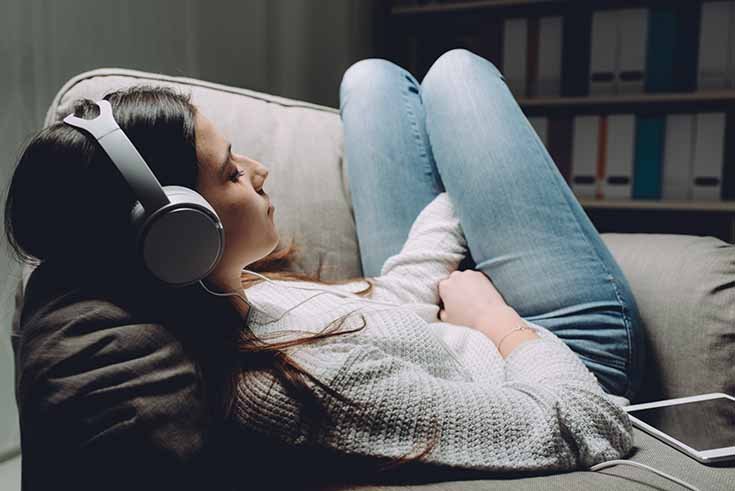
Create a Comfortable Sleeping Environment
The sounds playing in your bedroom aren’t the only environmental factor that can help—or hinder—your ability to get deep sleep. You can create the perfect sleep environment with a few simple swaps.
First, an optimal sleep environment is dark and cool. Darkness sends signals to your brain to produce melatonin, the sleep-wake hormone. Remove any nightlights from your room and any electrical devices that emit light. (If you can’t remove or unplug it, cover it.) Swap out sheer curtains for blackout curtains to block out streetlights, car lights, or even moonlight. Consider a sleep mask if you cannot get your room completely dark.
A cool room is perfect for sleeping. Your body temperature naturally drops each evening in preparation for sleep. If your room is too hot, you’ll interfere with this natural process. The ideal temperature for sleep is between 60° – 67°F.
If you struggle to get your room that cool, try taking a hot shower or bath an hour or two before bedtime. Your internal temperature will drop after you get out of the hot water.
Another way to cool down at night is to consider a cooling mattress.
Speaking of mattresses, it’s almost impossible to get good sleep if your bed isn’t comfortable. Mattresses should be replaced every seven to ten years, and pillows typically have a lifespan of one to two years. Even if you have yet to reach the recommended time for getting a new mattress or pillow, you may want to upgrade if yours is too soft, overly firm, or causing you pain.
Investing in a comfortable mattress could mean the difference between poor sleep and incredible sleep.
Avoid Light Before Bed
Street lights and night lights aren’t the only lights you’ll want to avoid before bedtime. The blue light from your phone, computer, TV, or tablet can have an impact on your sleep, as well.
Researchers have found that both ambient light and blue light from devices can suppress melatonin production and cause alertness in your brain and body. By avoiding blue light and bright light for two hours before bedtime, your body can release melatonin and signal your brain that it’s time to slow down and get ready for sleep.
If you can’t avoid blue light completely, try orange-tinted bluelight-blocking glasses before bed, which researchers have found to result in significant sleep improvements.
Reduce Stress
Stress can wreak havoc on your sleep. Feeling stressed results in a biochemical cascade of stress hormones that can disrupt your ability to get deep, restful sleep. While avoiding stressors from work, family, finances, and world events is impossible, you can learn how to mitigate your body’s response to stress.
One of the reasons meditation for sleep is so effective is its calming effect on your central nervous system. Research has repeatedly shown that meditation is an effective way of dealing with stress and anxiety.
Regular exercise is another tool that can help you stress less and sleep better. The key to using exercise for better sleep is to be sure that you’re exercising earlier in the day, not later. Give your body enough time to wind down, cool down, and wash out the exercise-induced endorphins (the “happy” chemicals that kick in when you’re moving and grooving) that can help you feel more alert and awake after a workout.

Address Sleep Disorders With Your Doctor
If you’ve tried everything in your power to get more deep sleep naturally but to no avail, it may be time to call a professional.
Some sleep disorders such as insomnia, narcolepsy, sleep apnea, circadian rhythm disorders, and restless legs syndrome (RLS), may need medical treatment.
Sleep disorders are common, with 80 different disorders affecting up to 70 million Americans. While sleep disruptions can happen to anyone, you may have a sleep disorder if you find yourself regularly experiencing sleep difficulties that negatively impact your ability to perform daytime activities.
What Can Affect Deep Sleep?
Some of the factors that influence your ability to get quality sleep are in your control, while others may require the assistance of a professional. These factors include:
Alcohol
Alcohol is known for its sedative and drowsy effects. However, alcohol is a known sleep disruptor. Alcohol may make it easier to fall asleep initially, but as the night goes on, it can fragment and disturb sleep. Chronic alcohol use in particular can have a negative impact on NREM sleep and disrupt delta wave activity.
Medications
Various prescription and OTC medications can impact sleep quality. A number of medications have insomnia as a known side effect, including some antidepressants, anticonvulsants, cold medications, and medications to lower blood pressure. Be sure to speak with a medical professional about possible sleep-related side effects of any medications you’re taking.
Caffeine
Caffeine is a stimulant that works by blocking sleep signals in your brain. Some people are more sensitive to caffeine than others, which means a late-afternoon stop at your favorite coffee shop could keep you wide awake long after your desired bedtime. The American Academy of Sleep Medicine recommends avoiding caffeine consumption in the evenings and late afternoons, but if you’re the sensitive type, you may want to skip caffeine altogether.
Mental Health
There is a strong connection between sleep and mental health. Conditions like depression, anxiety, ADHD, and grief can impact your body’s stress and sleep hormones. Worse, a lack of sleep can aggravate some mental health symptoms.
If you are experiencing a mental health condition and sleeplessness, talk to a medical professional about therapy, cognitive behavioral therapy (CBT), or other options available to you.
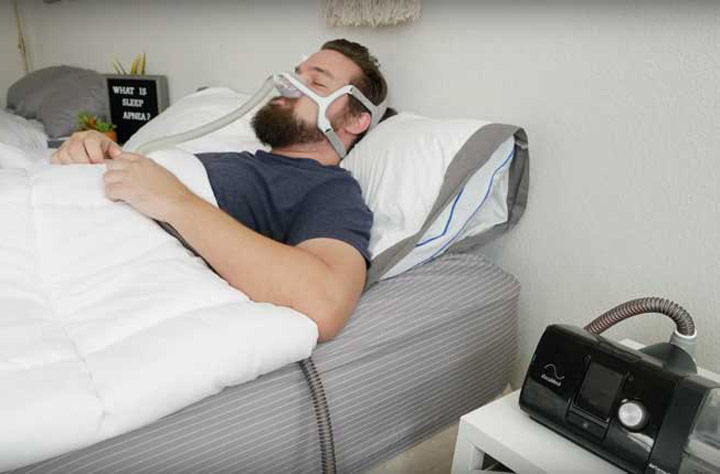
Sleep Disorders
As mentioned above, there are 80 known sleep disorders affecting about 20% of people in the United States. There is usually no single cause for a sleep disorder, although certain factors such as night shifts, depression, and underlying medical issues may play a role in developing one.
If you are experiencing consistent sleep disruptions, are feeling chronically tired and unrested, or feel like your sleep issues are impacting your daytime activities, you may want to consult a medical professional to see if you have a sleep disorder.
Temperature
Soaring temperatures can make it harder to fall and stay asleep. Your body naturally goes through a cooling down process in preparation for sleep, which a number of physical or environmental factors can disrupt.
You may have a hard time falling asleep if you’re experiencing hot flashes as a result of menopause or an illness or if your bedroom or bedding is too hot. Staying cool at night can make a big difference in the quality of your sleep.
How to Tell if You Aren’t Getting Enough Deep Sleep
During the deep sleep phase, thousands of brain cells “self-organize” in synchronicity. While this happens, memories are made, learning occurs, and motor skills are improved. But if you’re not getting enough deep sleep, you won’t experience the benefits of deep sleep.
Instead, you’ll likely experience the symptoms of sleep deprivation, which can include:
- Daytime sleepiness
- Irritability
- Trouble learning or focusing
- Forgetfulness
- Mistakes at work
- Falling asleep while driving
Final Thoughts
While it’s important to focus on the amount and quality of your overall sleep, being sure to get enough deep sleep is critical for your physical and mental performance. During deep sleep, your brain processes memories and helps you organize and learn new information, while your body works to repair and restore itself. There are steps you can take to encourage more quality deep sleep, many of which have been proven successful without the use of prescription pills or other sleep aids.
FAQs
How much deep sleep should you get?
You should get around 96 minutes of deep sleep a night if you are sleeping for eight hours, and 10-20% of your sleep time is spent in the deep sleep phase.
Is deep sleep more important than REM sleep?
All sleep cycles are important and have benefits for your brain and body. NREM deep sleep is the most restorative phase and most important for learning and memory functions.
How long should deep sleep last?
Stage 3 NREM sleep should last 20-40 minutes.
Is dreaming deep sleep?
Dreaming occurs during REM sleep, not during the deeper NREM sleep phases. If you are dreaming, you are not in deep sleep.

